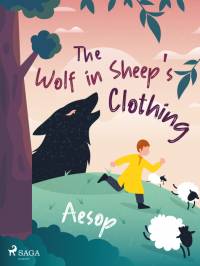The Wolf in Sheep's Clothing
part of the Aesop's Fables series
- Format:
- ePub
- Protection:
- Digital watermark
- Published:
- March 22, 2021
- Translater:
- V. S. Vernon. Jones
Delivery:
Immediately by email
Description of The Wolf in Sheep's Clothing
Do we see the real personality of people or is there more luring behind the surface? Sometimes the ones we trust the most might be playing a role contrary to their character.
In his timeless fables, Aesop whispers from the past knowledge which we think we know, but very often forget.
Aesop's fables feature animals, legendary creatures, plants, inanimate objects, or forces of nature that speak, solve problems, and generally have human characteristics. All the stories story lead to a particular moral lesson.
Aesop (620–564 BCE) was a storyteller that was believed to have lived in Ancient Greece. He is celebrated for a number of fables now collectively known as Aesop's Fables. In the few scattered sources about his life, Aesop was described as a slave who by his cleverness acquires freedom and becomes an adviser to kings and city-states.
Although Aesop's existence remains unclear, numerous tales credited to him were gathered across the centuries and in many languages in a storytelling tradition that continues to this day.
In his timeless fables, Aesop whispers from the past knowledge which we think we know, but very often forget.
Aesop's fables feature animals, legendary creatures, plants, inanimate objects, or forces of nature that speak, solve problems, and generally have human characteristics. All the stories story lead to a particular moral lesson.
Aesop (620–564 BCE) was a storyteller that was believed to have lived in Ancient Greece. He is celebrated for a number of fables now collectively known as Aesop's Fables. In the few scattered sources about his life, Aesop was described as a slave who by his cleverness acquires freedom and becomes an adviser to kings and city-states.
Although Aesop's existence remains unclear, numerous tales credited to him were gathered across the centuries and in many languages in a storytelling tradition that continues to this day.
Find similar books
The book The Wolf in Sheep's Clothing can be found in the following categories:
- Fiction > Fiction: literary and general non-genre > Classic fiction: literary and general
- Fiction > Fiction / Literature / Comics / Graphic novels: special features > Short stories
- Children’s, Teenage and Educational > Children’s / Teenage fiction and true stories > Children’s / Teenage fiction: Classic fiction
- Children’s, Teenage and Educational > Children’s / Teenage fiction and true stories > Children’s / Teenage fiction and true stories: Cultural heritage / traditional stories
- Interest qualifiers > Interest age / level (Content adapted or suitable for this age and above) > Interest age: from c 7 years
- Place qualifiers > Other geographical groupings: Oceans and seas, historical, political etc > Historical states, empires, territories and regions > Ancient World > Ancient Greece
- Time period qualifiers > BCE period – Protohistory > c 1000 BCE to start of CE period
© 2025 Book Solutions ApS Registered company number: DK43351621

